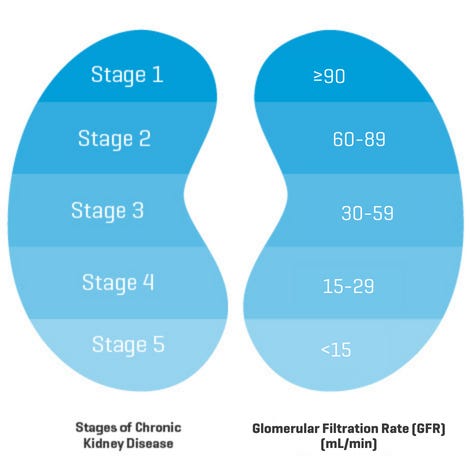Kidney failure, also known as renal failure, is a serious medical condition where the kidneys lose their ability to function effectively. This impairment can lead to a buildup of waste and toxins in the body, causing various complications. Understanding the stages of kidney failure is crucial for both patients and healthcare providers to manage the condition effectively. Now ,we’ll explore the five stages of kidney failure, their symptoms, causes, and potential treatments.
Stage 1: Kidney Damage with Normal or Increased Glomerular Filtration Rate (GFR) At this stage, there may be kidney damage, but the kidneys are still functioning relatively well. Patients may not experience any symptoms, and kidney function tests may show normal or slightly increased GFR (glomerular filtration rate), which measures how well the kidneys are filtering waste from the blood. Common causes of stage 1 kidney disease include diabetes, high blood pressure, and certain autoimmune diseases. Treatment focuses on managing underlying conditions and lifestyle changes to prevent further kidney damage.

Stage 2: Mild Decline in Kidney Function (GFR 60–89 mL/min) In stage 2, there is a mild decline in kidney function, with a GFR ranging from 60 to 89 mL/min. Some patients may start experiencing mild symptoms such as fatigue, changes in urine frequency, or foamy urine due to proteinuria (excess protein in the urine). The underlying causes of kidney disease become more evident at this stage, and early intervention is crucial to slow the progression of the disease. Treatment may include medication, dietary changes, and close monitoring of kidney function.
Stage 3: Moderate Decline in Kidney Function (GFR 30–59 mL/min) Stage 3 is further divided into stage 3A (GFR 45–59 mL/min) and stage 3B (GFR 30–44 mL/min). Patients may experience more noticeable symptoms such as swelling in the legs, ankles, or face (edema), increased blood pressure, and electrolyte imbalances. Treatment focuses on managing symptoms, controlling blood pressure, and preventing complications such as anemia and bone disease. Patients may also be referred to a nephrologist (kidney specialist) for specialized care and monitoring.
Stage 4: Severe Decline in Kidney Function (GFR 15–29 mL/min) At stage 4, kidney function is significantly impaired, with a GFR ranging from 15 to 29 mL/min. Symptoms become more severe, including fatigue, nausea, vomiting, itching, difficulty concentrating, and shortness of breath. Patients may require more intensive treatments such as dialysis or kidney transplant evaluation. Lifestyle modifications, including dietary restrictions and fluid management, are essential to maintain overall health and quality of life.
Stage 5: End-Stage Kidney Disease (GFR <15 mL/min or Dialysis) End-stage kidney disease (ESKD) occurs when kidney function is severely compromised, with a GFR less than 15 mL/min or when a patient requires dialysis to filter waste from the blood artificially. Symptoms may include extreme fatigue, muscle cramps, difficulty sleeping, and decreased appetite. Dialysis or kidney transplantation becomes necessary to sustain life at this stage. Patients with ESKD require ongoing medical care, support, and coordination between healthcare providers to manage their condition effectively.
Conclusion:
Understanding the five stages of kidney failure is essential for early detection, intervention, and management of this complex condition. By recognizing the signs and symptoms associated with each stage, patients and healthcare providers can work together to implement appropriate treatments, improve quality of life, and potentially slow the progression of kidney disease. Regular monitoring of kidney function, adherence to treatment plans, and lifestyle modifications are key components of comprehensive kidney care. If you or a loved one are at risk for kidney disease or experiencing symptoms, consult with a healthcare professional for personalized evaluation and management.
Comments
Post a Comment